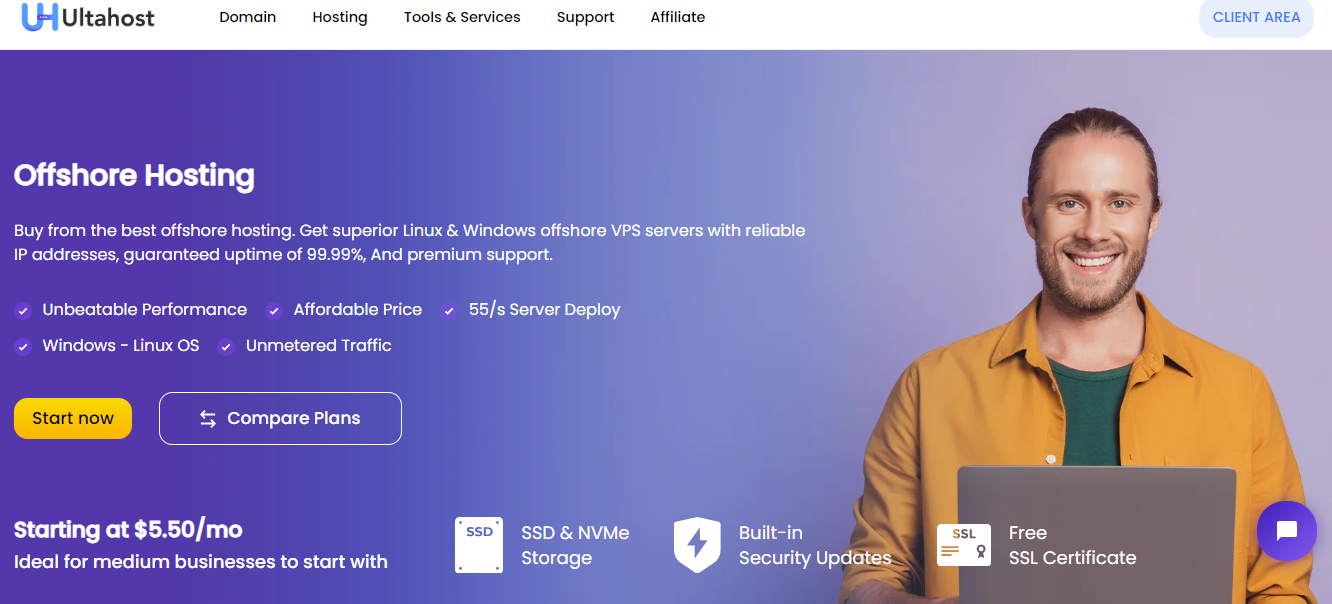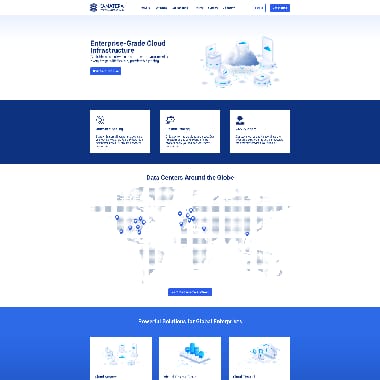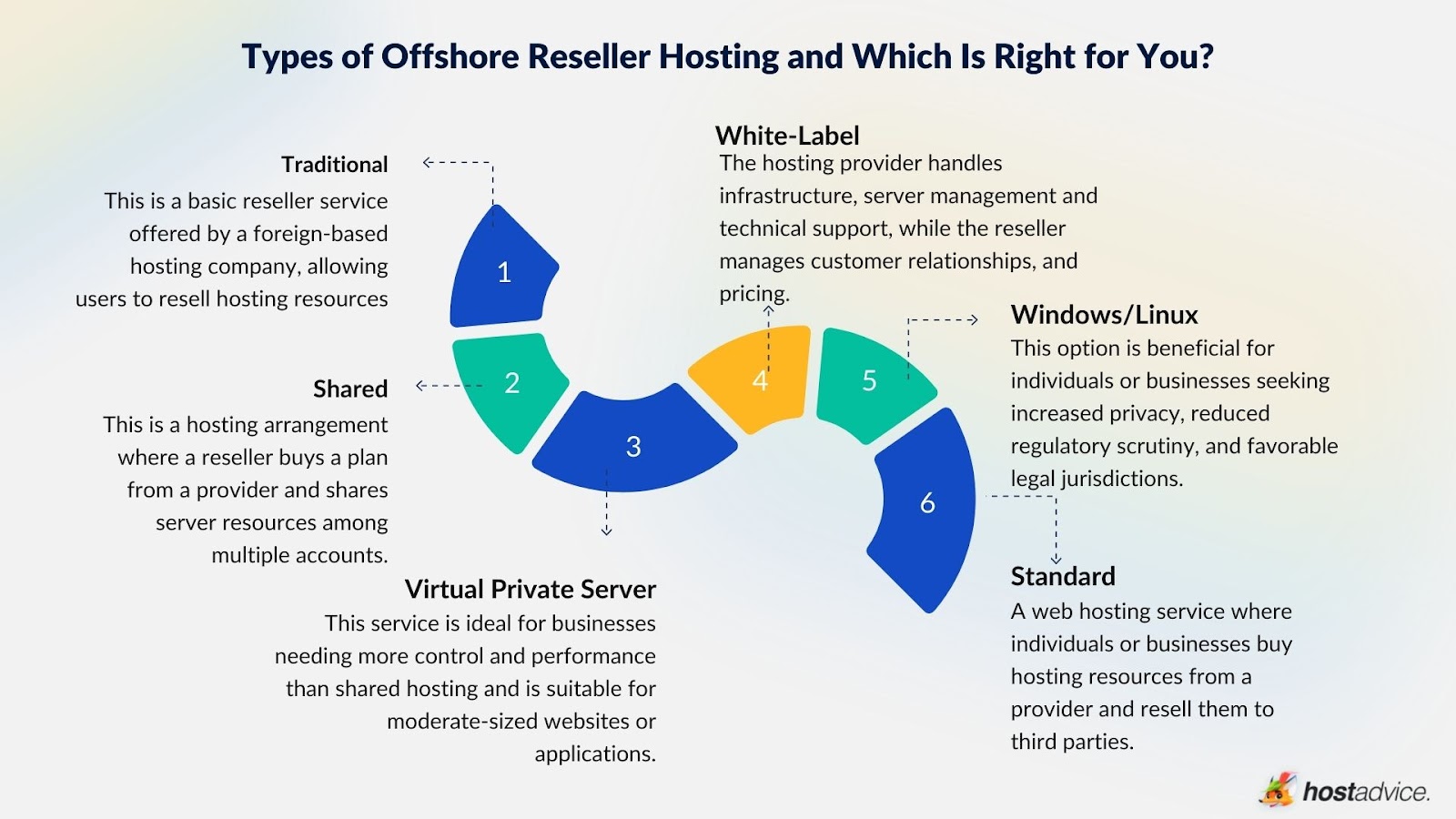Offshore reseller hosting is a web hosting model where resellers buy resources from a foreign provider and resell them to clients. The resellers act as intermediaries, managing client accounts, providing support, and branding services. Key features include white labeling, server resources, management tools, technical support, legal considerations, and flexibility. Let’s dive into the list of top offshore reseller hosting providers.
Top 5 Hosting Providers for Offshore Reseller Hosting 2024
- HostArmada – Efficient Offshore Reseller Hosting for Global Expansion
- Ultahost – Best Offshore Reseller Hosting Overall
- Kamatera – Dynamic Offshore Reseller Hosting for Expansive Business Opportunities
- PrivateAlps – Elite Offshore Reseller Hosting for Enhanced Security and Customization
The Best Hosting Providers for Offshore Reseller Hosting (Bought and Tested)






- Overall Score: 4.5
- Features: 4.4
- Reliability: 4.5
- User-Friendly: 4.4
- Support: 4.5
- Pricing: 4.5
Hostarmada provides Offshore Reseller Hosting services, designed for businesses and entrepreneurs seeking to extend their hosting services to a global audience. This service is ideal for resellers targeting international markets, offering flexibility in terms of content regulations and data laws.
Detailed Analysis:
Features: Likely includes a range of customizable hosting plans, support for multiple software applications, and enhanced security features, tailored for an international clientele.
Reliability: Presumed to offer reliable performance and high uptime, crucial for maintaining client satisfaction across various markets.
User-Friendly: Expected to feature user-friendly control panels and management tools, facilitating ease of use for resellers regardless of technical expertise.
Support: Anticipated to provide knowledgeable customer support, well-versed in the specifics of offshore hosting.
Pricing: Pricing is estimated to be competitive, reflecting the balance between quality and affordability for offshore reselling.
Pros and Cons:
- Potential for broad market reach with services catered to an international audience.
- Customizable plans to suit a variety of client needs and preferences.
- Enhanced security measures suitable for diverse hosting environments.
- Support team likely equipped to handle offshore hosting challenges.
- Specific details on features, performance, and support are not confirmed.
- Managing diverse legal and regulatory requirements can be complex in offshore settings.






Ultahost is a top offshore reseller hosting provider known for affordability, performance, reliability, and user-friendliness. They offer plans with ample resources, redundant data centers, 24/7 support, free SSL certificates, advanced security features, and a variety of operating systems and software configurations.
- Overall score – 5
- Pricing – 5
- Features – 5
- Performance – 5
- Support – 5
- User Friendly – 5
Pricing: Ultahost’s lowest plan is VPS Basic, which costs $5.50/month for 1 CPU Core, 1 GB RAM, 30 GB NVMe SSD, Managed Server, and 1 IPv4 Dedicated IP. Its highest plan, the VPS Enterprise, costs $21.50/month for 4 CPU Cores, 6 GB RAM, 100 GB NVMe SSD, Managed Server, and 1 IPv4 Dedicated IP. Ultahost has a 30-day money-back guarantee and accepts PayPal, Bitcoin, and major credit cards as payment options.
Features: Ultahost offers a range of advanced security features such as DDoS protection, intrusion detection, and spam filtering to protect against malware, hacking attempts, and other online threats. Other features include NVMe SSD storage, managed offshore servers, unlimited bandwidth, and unlimited application installation.
Performance: Ultahost offers SSD-backed offshore web hosting, global data centers, managed servers, 24/7 support, Cloudflare CDN, a 99.99% uptime, HTTP/2 enabled servers, and SSD NVMe disk drives. Users never have to worry about speed, security, or support for their hosting needs.
Support: Ultahost offers 24/7 real-time monitoring support through various channels, including live chat, troubleshooting, an active community, a ticketing system, email, a comprehensive knowledge base, and a blog for relevant topics.
User Friendly: Ultahost has earned a reputation as an easy-to-use and user-friendly service. It provides users with the well-known cPanel, which is incredibly straightforward for beginners. Furthermore, Ultahost provides managed servers, which relieve customers of any technical concerns and allow them to concentrate on their business.
Additional parameters – Scalable Resources: Ultahost’s offshore reseller hosting plans provide scalable resources, enabling resellers to adjust their plans to meet customer base growth and traffic demands.
Pros and Cons
- Scalable DDR5 RAM
- 99.99% uptime
- Full root access
- BitNinja security
- HTTP/2 Enabled Servers
- Auto healing
- CDN add-on
- 30-day money-back
- The CDN add-on is not free in the Basic Windows VPS plan
- Monthly plans do not come with free domain transfers







- Overall Score: 4.7
- Features: 4.6
- Reliability: 4.8
- User-Friendly: 4.6
- Support: 4.7
- Pricing: 4.6
Kamatera offers Offshore Reseller Hosting, tailored for businesses and entrepreneurs looking to extend their hosting services globally. This type of hosting is particularly beneficial for resellers targeting markets with diverse regulatory environments and seeking more flexibility in terms of content and data law compliance.
Detailed Analysis:
Features: Expected to include a range of customizable hosting options, multi-software compatibility, and robust security measures suitable for an international client base.
Reliability: Likely characterized by high uptime and stable performance, essential for maintaining client satisfaction and operational efficiency in various markets.
User-Friendly: Presumed to offer user-friendly control panels and tools, facilitating ease of management for resellers of different technical backgrounds.
Support: Anticipated to provide comprehensive support with expertise in the nuances of offshore hosting, aiding resellers in efficiently managing and scaling their services.
Pricing: Estimated to offer competitive pricing models that cater to the diverse needs and budgets of offshore resellers.
Pros and Cons:
- Broad market appeal with the flexibility to cater to international clients.
- Customizable hosting plans adaptable to various customer requirements.
- Strong focus on security and reliable performance.
- Expert support team equipped to handle offshore hosting specifics.
- Specific service details and feature offerings are not confirmed.
- Managing diverse regulatory and legal requirements across jurisdictions can be complex.

Expert Rating Overview:
- Overall Score: 4.7
- Features: 4.8
- Reliability: 4.9
- User-Friendliness: 4.6
- Support: 4.8
- Value for Money: 4.7
PrivateAlps is renowned in the offshore reseller hosting sector for providing solutions that emphasize enhanced security and high customization. This service is perfect for web hosting resellers, IT consultants, and digital agencies looking for a secure, flexible, and robust reseller hosting platform. PrivateAlps’s offshore reseller hosting stands out for its focus on offering privacy-oriented solutions, paired with customizable features that allow resellers to tailor services to their clients’ unique needs.
Feature Set: PrivateAlps offers an extensive array of features for offshore reseller hosting, including a customizable range of hosting plans, white-label options, advanced security protocols, and support for various applications and services.
Stability and Dependability: Emphasizing consistent performance and uptime, PrivateAlps ensures that its reseller hosting services remain reliable and efficient, crucial for maintaining client satisfaction and operational continuity.
Ease of Management: Despite its focus on security and customization, PrivateAlps’s hosting environment is user-friendly, with intuitive control panels and tools for effective management of reseller operations.
Support Expertise: Known for its superior customer support, PrivateAlps offers in-depth technical assistance, providing valuable resources and guidance to help resellers thrive in their business ventures.
Pros and Cons:
- Tailored and secure solutions ideal for offshore reseller hosting
- Strong focus on privacy and data protection for resellers and their clients
- High-quality customer support and technical assistance
- Pricing may reflect the premium nature of specialized hosting services
- Might require a higher level of technical expertise for full utilization of features
Ranking comparison between the Top Providers
The Best Hosting Provider for Offshore Reseller Hosting: Final Recommendations
In this article, we have evaluated various offshore reseller hosting providers by considering several factors, including their features, support, pricing, ease of use, and reliability.
Ultahost is our top choice among these six best offshore reseller hosting services due to their reliable services and a wide array of features. They offer to host individuals and businesses of all sizes, with customizable features and pricing. Ultahost has consistent uptime and great customer service, making it an excellent choice for those who desire affordability, performance, reliability, and user-friendliness.
Types of Offshore Reseller Hosting and Which Is Right for You?

- Traditional Offshore Reseller Hosting: This is a basic reseller service offered by a foreign-based hosting company, allowing users to resell hosting resources like disk space, bandwidth, and features suitable for individuals or businesses.
- Shared Offshore Reseller Hosting: This is a hosting arrangement where a reseller buys a plan from a provider and shares server resources among multiple accounts. Each reseller can manage individual accounts for their clients. This is suitable for small businesses or budget-conscious individuals, as it doesn’t require extensive resources or customization.
- Virtual Private Server (VPS) Offshore Reseller Hosting: It involves purchasing Virtual Private Server resources from an offshore hosting provider, offering benefits like enhanced privacy, reduced regulatory scrutiny, and specific legal jurisdictions. This service is ideal for businesses needing more control and performance than shared hosting and is suitable for moderate-sized websites or applications.
- White-Label Reseller Hosting: It allows individuals or businesses to resell hosting services under their brand name. The hosting provider handles infrastructure, server management and technical support, while the reseller manages customer relationships, branding, and pricing. Ideal for small businesses or budget-conscious individuals without extensive resources or customization.
- Linux/Windows Offshore Reseller Hosting: This is a service offered by a reseller based on the Linux/Windows operating system, hosted offshore. This option is beneficial for individuals or businesses seeking increased privacy, reduced regulatory scrutiny, and favorable legal jurisdictions. It is cost-effective and widely used for various web applications.
- Standard Reseller Hosting: Standard reseller hosting is a web hosting service where individuals or businesses buy hosting resources from a provider and resell them to third parties. The reseller acts as an intermediary, managing accounts and providing customer support. This service is suitable for small to medium-sized businesses with basic requirements.
Factors to consider when choosing an Offshore Reseller hosting plan
- Location and Legal Jurisdiction: Research the offshore location where the hosting provider operates. Consider the legal and regulatory environment in that jurisdiction. Ensure it aligns with your business goals and provides the level of privacy and legal protection you require.
- Server Performance and Reliability: Evaluate the performance and reliability of the hosting provider’s servers. Look for features such as SSD storage, sufficient RAM, and reliable hardware to ensure optimal performance for your clients’ websites.
- Network Speed and Latency: Consider the network speed and latency from the offshore location to your target audience. Faster network speeds and lower latency can contribute to better website performance for end users.
- Technical Support: Assess the quality and availability of technical support. Ensure that the hosting provider offers responsive customer support, preferably 24/7, to address any issues or inquiries promptly.
- Scalability and Flexibility: Choose a hosting plan that can accommodate your anticipated growth and provide the flexibility to upgrade resources as your client base expands. This ensures you can seamlessly handle increased traffic and demand without performance bottlenecks.
- White-Labeling and Branding: Confirm whether the hosting provider allows white-labeling, which enables you to brand the hosting services with your company name and logo. This helps in presenting a consistent brand image to your clients.
- Control Panel and Management Tools: Evaluate the control panel and management tools provided by the hosting provider. A user-friendly interface makes it easier to manage your clients’ hosting accounts and configure services.
- Uptime Guarantee: Look for a hosting provider that offers a high uptime guarantee. This ensures that your client’s websites will be accessible to visitors without frequent interruptions.
- Security Features: Assess the security features provided by the hosting provider. Look for features such as firewalls, DDoS protection, and regular backups to safeguard your clients’ data and websites.
- Terms and Conditions: Carefully review the terms and conditions of the hosting provider. Ensure that you understand the contractual obligations, including billing terms, refund policies, and any restrictions on content or activities.
- Cost and Pricing Structure: Consider the cost of the reseller hosting plan and the pricing structure. Evaluate whether the resources provided align with the pricing and if there are any hidden fees.
- Reviews and Reputation: Research customer reviews and the reputation of the hosting provider. This can provide insights into the experiences of other resellers and the overall reliability of the hosting service.
Managed Vs. Unmanaged Offshore Reseller Hosting
Managed offshore reseller hosting refers to a hosting service where a reseller purchases hosting resources from a provider located in an offshore location, and the hosting provider takes on the responsibility of managing and maintaining the server infrastructure. In this arrangement, the reseller can focus on selling hosting services to their clients, while the hosting provider handles the technical aspects of server administration.
Conversely, with unmanaged offshore reseller hosting, a reseller purchases hosting resources from a provider located in an offshore location, and the reseller is responsible for the management and maintenance of the server infrastructure. In this arrangement, the hosting provider offers the hardware and network connectivity, but the reseller takes on the burden of server setup, configuration, security, updates, and ongoing administration.
How We Rank and How You Should Choose Your Offshore Reseller Hosting Provider
- Types of Hosting Offered5%
- Uptime Commitment8%
- Speed Optimization%
- Available Space and Bandwidth7%
- Scalability Options6%
- Security Enhancements7%
- Ease of Use8%
- Offshore Hosting-Specific Support12%
- Developer Tools and Extras5%
- User Reviews30%
- Starting price3%
We perform category-specific testing to determine which offshore reseller hosting companies are the best. We create a list of pertinent variables for the category in which we are ranking and conduct independent performance evaluations of each provider who meets the requirements for that particular category. We also take into account thousands of actual, unbiased user reviews.
Here are the factors that we tested and that you need to take into consideration when choosing the best offshore reseller hosting:
- Types of Hosting Offered (5%): The majority of suppliers provide cloud, dedicated, VPS, and shared server hosting. Additionally, some provide reseller hosting.
- Uptime Commitment (8%): The uptime commitment should be 99.95% or higher, but some providers offer lower-tiered plans with less. Choose plans with at least a 99.95% uptime guarantee, as many offer a 99.99% guarantee on entry plans.
- Speed Optimization (9%): Offshore web hosting solutions are not known to cause slow-loading websites. However, the distance between the server location and the target audience can affect the website’s loading speed. Many hosts use CDN, caching, and SSD-only servers to ensure optimal loading speeds, regardless of the target audience’s location.
- Available Space and Bandwidth (7%): The majority of people who need offshore hosting do so to host material for their websites. Therefore, be sure the storage capacity meets your demands before committing to a plan. You have to take into account the amount of RAM, accessible bandwidth, and disk storage.
- Scalability Options (6%): Every website advances over time. Therefore, having a service that lets you raise the restrictions of your hosting resources would be beneficial. You can upgrade to a more expensive plan or add more resources to your current one. The web host is responsible for making sure that there are no outages or slowdowns after the updates.
- Security Enhancements (7%): Multiple attacks frequently target websites hosted on offshore platforms. The ideal situation would be one where your provider secures their services and safeguards your website using both physical and online security measures. They should also take legal action to safeguard your identity and data.
- Ease of Use (8%): Most of the top offshore web hosts are easy to use. However, the simplicity of the hosting option will depend on the hosting plan you select. An unmanaged offshore VPS hosting plan is less user-friendly than a shared hosting plan. Still, some providers feel obligated to make their dashboards as user-friendly as possible.
- Offshore Hosting-Specific Support (12%): Some crucial features to check for are on-time assistance, anonymous payment alternatives, data protection, and data needs. The top web offshore hosting providers take very little information from you. Some merely request a video email to keep you up to date on your website. You should also check that you can contact the customer care service when you need assistance.
- Developer Tools and Extras (5%): Developer tools are required for offshore web hosting, although some developers want to host and administer web applications anonymously. If that describes you or your brand, you should look for developer-friendly providers.
- User Reviews (30%): User reviews often provide an accurate picture of how well an offshore hosting service has performed over time. If a supplier has already violated client data, they will almost certainly do it again. So we look into past and present user experiences to get a thorough picture of the hosting company. We take special note of how they manage DMCA Reuters, data privacy rules, and overall speed.
- Starting price (3%): Make sure the price is commensurate with the value you receive, regardless of whether you are on a tight budget or have more cash to spend. Comparing the pricing of the plan to the amenities supplied is an easy way to accomplish this. You should also factor in lifetime domains from some providers when estimating how much it will cost.
What Is an Offshore Reseller Hosting, and Who Is It For?
Offshore reseller hosting is a web hosting service where a reseller buys resources from a provider in an offshore location and sells them to their clients under their brand. This model allows individuals or businesses to enter the web hosting industry without investing in infrastructure and server management. Key features include the ability to white-label services and control over pricing, plans, and customer support.
Offshore reseller hosting is suitable for entrepreneurs, web designers, and developers, as well as small to medium-sized businesses (SMBs) that want to offer additional services without in-house server infrastructure. Offshore hosting can also be beneficial for those seeking privacy and specific legal jurisdictions, and for individuals or businesses facing restrictive regulatory environments in their home country.













